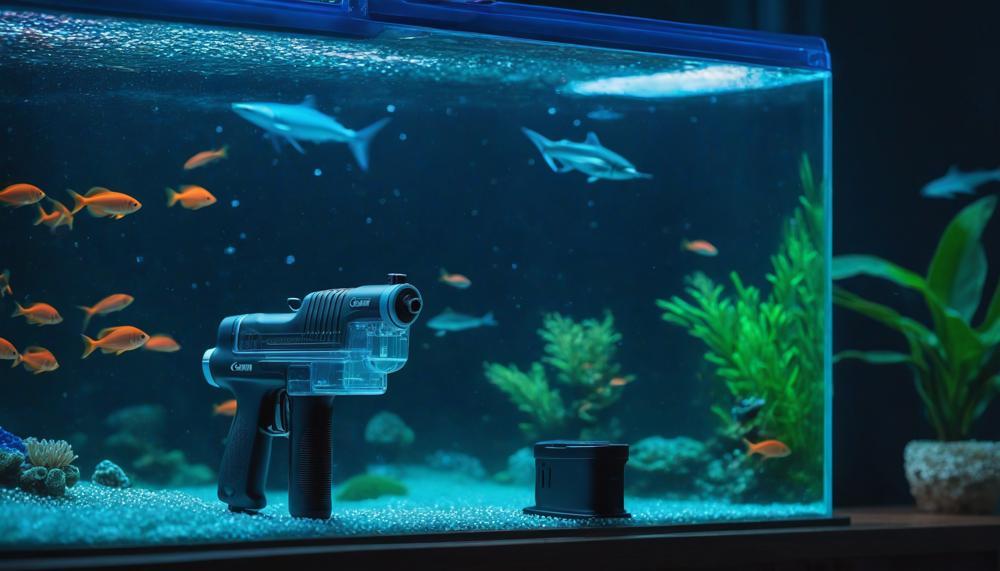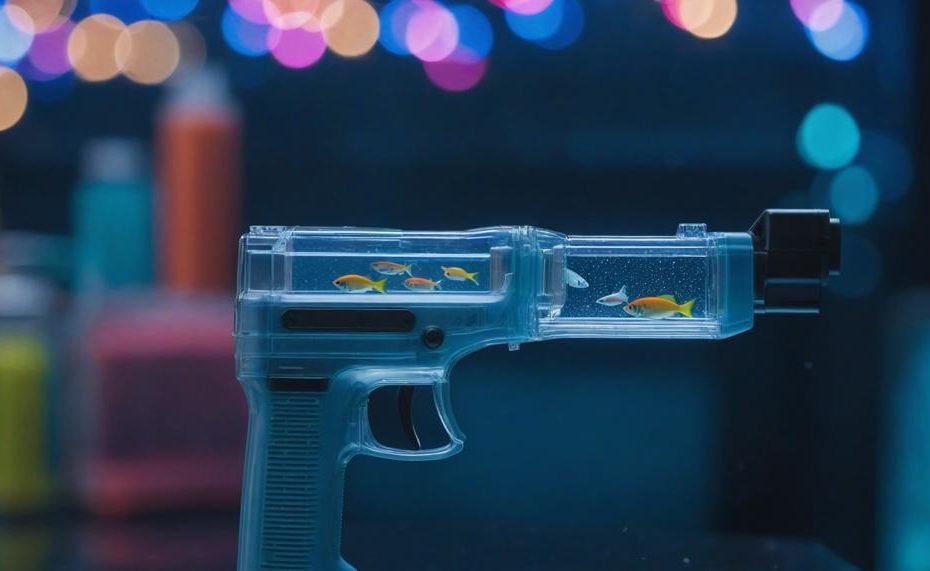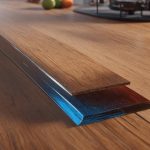No, you shouldn’t put a glue gun in your aquarium. Glue guns and the adhesives they use are not designed for underwater applications and can harm your aquatic life. Here’s a quick rundown on why using a glue gun in your aquarium is a bad idea and what you should use instead:
- Toxicity Concerns: Glue sticks used in glue guns often contain chemicals that can leach into the water, posing a risk to your fish and plants.
- Water Resistance: Hot glue doesn’t hold up well under water for extended periods, leading to potential structural failures in your aquascaping.
- Temperature Issues: The high temperatures required to melt the glue can damage the delicate balance of your aquarium environment.
Instead, opt for aquascaping glues, specially formulated for use in marine conditions. These adhesives, typically cyanoacrylates (super glues), provide a safe and effective way to secure rocks and decorations in your aquarium.
Stay tuned as we delve deeper into the best practices for aquarium maintenance and the ideal materials to use for a thriving, beautiful aquatic ecosystem.
Table of Contents
- 1 How To Know If The Glue Is Safe For Aquariums
- 2 The Aquarium Safe Types Of Glues And How To Use Them
- 3 The Best Aquarium Safe Glue
- 4 How To Build A Rock Aquascape With Glue: Best Tips
- 5 Is Elmer’s Glue a Felt-Friendly Choice?
- 6 Elmer’s Glue and Fabrics: A Sticky Tale
- 7 Does Elmer’s Glue Hold Up on Wood?
- 8 Conclusion
How To Know If The Glue Is Safe For Aquariums
Determining if a glue gun is safe for aquarium use requires careful consideration of the glue’s composition and labeling. Here are key steps to ensure safety:
Check the Label
Ensure the glue is explicitly labeled as “reef safe” or “aquarium safe.” Products not specifically labeled for aquarium use might contain harmful chemicals.
Glue Composition
- Cyanoacrylate-Based Adhesives: Safe for aquariums if labeled correctly. These are often found in super glues and are ideal for attaching plants and corals.
- Silicone Adhesive: 100% silicone sealants without additives are generally safe. They are excellent for sealing gaps and making repairs.
- Epoxy Glues: These can be safe if labeled for aquarium use, suitable for more substantial structural work.
Avoid Hot Glue:
Hot glue is unsuitable for aquariums. It can melt and leach harmful chemicals into the water, posing a risk to aquatic life.
Durability and Toxin Release:
Opt for long-lasting glues that do not release toxins over time. Safety over extended periods is crucial for maintaining a healthy environment.
Application Method:
Ensure the application area is clean and dry before applying the glue. Residues or debris can weaken the bond and potentially release harmful substances.
The Aquarium Safe Types Of Glues And How To Use Them
When working on aquarium repairs or projects, selecting the right type of glue is vital for ensuring the safety of your aquatic inhabitants. Here are the different types of aquarium-safe glues and their applications:
| Type of Glue | Uses | Instructions |
| Silicone-Based Glue | Ideal for attaching glass panels, repairing leaks, and securing aquarium components. | Ensure surfaces are clean and dry before application. Apply a bead of silicone to the joint or area needing repair. Allow to cure for 24-48 hours before refilling the aquarium with water. Learn more about using aquarium silicone. |
| Cyanoacrylate (Super Glue) | Commonly used for attaching ornaments, live plants, and coral frags. Ideal for aquascaping projects. | Apply a small amount to the base of the item being attached. Press it firmly in place and hold for a few seconds. It bonds quickly, making it ideal for quick fixes. Ensure it is 100% cyanoacrylate for safety. Read more about using super glue in aquariums. |
| Epoxy Resin | Used to construct custom aquarium structures such as rock formations, caves, and coral mounts. | Mix the two parts of the epoxy as per the manufacturer’s instructions until a uniform colour is achieved. Apply the epoxy to the surfaces being joined. It can be sculpted and shaped before it cures. Allow it to cure for at least 24 hours. Find out more about epoxy resin applications. |
| Polyurethane Glue | Suitable for sealing joints and gaps, and bonding a variety of materials, including plastic and wood. | Apply a thin layer of glue to one surface. Press the pieces together and hold them until the glue sets. Curing time varies, so check the product’s instructions. Ensure the glue is aquarium-safe. Discover how to use polyurethane glue. |
The Best Aquarium Safe Glue
When it comes to gluing items within your aquarium, you need adhesives that are both safe for aquatic life and effective under water. The top types of glue that are safe to use in aquariums include Cyanoacrylate Super Glue and pure silicone. Here’s a detailed look at these adhesives:
| Type | Description | Applications |
|---|---|---|
| Cyanoacrylate Super Glue | This is a fast-acting adhesive that bonds quickly, even in wet conditions. It’s non-toxic once cured and safe for all types of aquariums. |
|
| Pure Silicone | Aquarium-safe silicone is free of additives and mold inhibitors. It creates strong, waterproof seals and remains flexible over time. |
|
How To Build A Rock Aquascape With Glue: Best Tips
When building a rock aquascape in an aquarium, using glue can help create stable, aesthetically pleasing structures. Here are some essential tips for effectively using glue in your aquascaping projects:
| Tip | Details | Additional Information |
| Choose the Right Adhesive | Use epoxy for dry rocks and BRS Extra Thick Super Glue Gel for wet rocks. | Bulk Reef Supply |
| Surface Preparation | Clean and dry rock surfaces thoroughly. | Ensure no algae or debris is present. |
| Applying the Glue | Use a combination of epoxy and super glue gel for strength and quick setting. | Avoid excess glue to prevent visible squeeze-out. |
| Positioning and Curing | Hold rocks in place for a few minutes and allow 24 hours for curing. | Proper curing ensures a stronger bond. |
| Safety and Environment | Work in a well-ventilated area and use gloves. | Use aquarium-safe products only. |
By following these tips, you can create a stunning and stable rock aquascape in your aquarium, ensuring a safe and aesthetically pleasing environment for your aquatic life.
Is Elmer’s Glue a Felt-Friendly Choice?

Yes, Elmer’s Glue is a felt-friendly choice. Elmer’s Glue, particularly the Elmer’s Glue-All formula, is well-suited for bonding felt to various surfaces. Its versatility and non-toxic nature make it a go-to adhesive for felt projects. The glue dries clear, ensuring a neat finish without visible residue.
However, it is essential to apply it sparingly and allow ample drying time for the best results. For heavy-duty felt projects or those requiring a stronger bond, a specialized fabric glue might be more appropriate.
| Pros of Using Elmer’s Glue with Felt | Cons of Using Elmer’s Glue with Felt | Alternative Adhesives |
|
|
Elmer’s Glue works well for lightweight felt applications, school projects, and crafts.
Elmer’s Glue and Fabrics: A Sticky Tale
Using Elmer’s Glue on fabrics can be an effective and safe method if done correctly. Here’s how to achieve that without causing any damage:
| Step | Instructions | Notes |
| Select the Right Fabric | Use non-stretchy fabrics like cotton, linen, and felt | Avoid delicate or stretchy materials |
| Preparation | Ensure fabric is clean and dry | Dirt and moisture weaken the bond |
| Application | Apply a thin, even layer of glue | Thick layers can stiffen fabric |
| Drying | Allow complete drying before handling | May take several hours |
| Testing | Test on a fabric scrap first | Ensures compatibility with your fabric |
| Usage Tips | For appliqué, use a thin layer for precise placement | Combining with sewing adds durability |
Does Elmer’s Glue Hold Up on Wood?
No, Elmer’s Glue is not suitable for use in aquariums. The chemicals in Elmer’s Glue can be harmful to fish and other aquatic life, potentially altering the water chemistry and posing a risk to the tank’s ecosystem. Instead, it is recommended to use adhesives specifically designed for aquarium use, such as aquarium-safe silicone sealants or epoxy. These products are non-toxic and ensure the safety of your aquatic pets.
For those looking to repair or decorate their aquariums, here is a comparison of suitable and unsuitable adhesives:
| Adhesive Type | Suitable for Aquariums | Details |
| Elmer’s Glue | No | Contains harmful chemicals that can alter water chemistry and harm aquatic life. |
| Aquarium-Safe Silicone Sealant | Yes | Non-toxic, designed specifically for aquarium use, safe for aquatic life. |
| Epoxy (Aquarium-Safe) | Yes | Non-toxic, strong adhesive properties, ideal for repairs and decorations in aquariums. |
Conclusion
Considering putting a glue gun in your aquarium? Think again. Glue guns and their adhesives are not designed for underwater use and can harm your aquatic life. The hot glue sticks often contain chemicals that leach into the water, posing serious risks to fish and plants. Additionally, hot glue does not hold up well in water, leading to potential structural failures, and the high temperatures needed to melt the glue can disrupt your aquarium’s delicate balance.
Instead, choose adhesives specifically formulated for aquariums. Cyanoacrylate-based super glues, often labeled “reef safe” or “aquarium safe,” are ideal for attaching plants and corals. 100% silicone sealants without additives are perfect for sealing gaps and making repairs. Epoxy glues, if labeled for aquarium use, are excellent for structural work.
Always check the label to ensure the glue is safe for aquatic environments. Opt for durable, non-toxic adhesives that won’t release harmful substances over time. By prioritizing the safety of your aquatic pets and using the right materials, you can create a thriving, beautiful underwater world.






